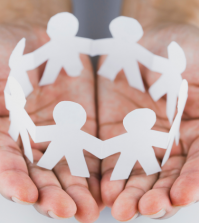- Mothering in a Fractured TimePosted 3 days ago
- Beneath the Surface: Revealing Life’s Goals nurtured from a Spiritual SeedPosted 6 days ago
- How We Kept Marital Peace while Traveling the World with Our KidsPosted 2 weeks ago
- How I Coped with Feeling Lost in a Changing SocietyPosted 2 weeks ago
- The Unexpected Liberation of a Butt DialPosted 2 months ago
- Why is France making abortion a constitutional right?Posted 2 months ago
Are You Using Shame as a Form of Discipline? ~Trisha Savoia.

By Trisha Savoia.
We are here for connection. And we especially want to feel connected with our children. We are happiest when we feel connected – to our spouse, to our children, to our friends, and to our Source (whatever you choose to call it…God, Universe, Higher Self).
So why is there so much disconnection? Why are we hearing about more family members who no longer communicate, friends that have parted ways, struggles with our children….?
After listening to Dr. Brene Brown on Oprah’s Super Soul Sunday, I received a big ah-ha on this topic.
One of the factors is shame…and I think it’s a big one. Shame is used to verbally stop unwanted and undesirable behaviour. Shame is often used as a form of discipline. Of course, we don’t always see that this is the case. It’s become so common that we are unaware of the impact it has on our children…and our connection with them.
As quoted from Dr. Brene Brown – “Shame unravels our connection.”
Shaming makes the child feel:
• Wrong for feeling what they feel
• Bad for wanting what they want
• Guilty for needing something
• Less than and unworthy for making a “wrong” unapproved choice
What does shame disciplining look like?
• “Shame on you! You shouldn’t have touched that.”
• “Stop being so selfish!”
• “Good kids always listen to their parents.”
• “You’re driving my crazy when you keep saying ‘mom, mom’ Just give me a minute!”
• “Come on, you’re old enough not to cry.”
• “Your friend ‘so and so’ is doing it. Why won’t you?”
• “Look around you. Do you see anyone else behaving like you?”
• “Grow up!”
• “I wouldn’t have gotten so angry if you just did what I told you in the first place.”
• “You should’ve known better. You’re smarter than that.”
…and the list goes on. Shame takes the form of:
• Put-downs
• Embarrassment (saying something or poking fun of them)
• Disapproval of their actions or accomplishments
• Blaming
• Expressing moral judgements (believing your way is the right way therefore communicating your disappointment in their thoughts, actions, or behaviour)
• Expectations based on your view of what proper behaviour is
• Gender-based expectations
• Comparison
Shame creates many consequences, one of them being disconnection. Since we are wired for connection, this can have dire consequences.
Looking to my own life, moments of shame are not quickly forgotten – times where I felt that the choices I made were viewed as “wrong” and “bad”; times where I felt I was being judged for not handling a situation the “right” way; times where “I should’ve known better”; times where I experienced moral judgment.
Whether it happened as a child or now as an adult, I can confirm from my own experience that being met with these forms of shaming, results in pulling back and disconnecting from the source of the shame.
As children, disconnection is done unconsciously as a protective mechanism, however as adults we can make the conscious choice to be around people who uplift, support and inspire versus shame us.
As adults, we can pay attention to the emotional environment we want to be in, and make choices based on that. Children don’t have the luxury of simply choosing not to be around their parents. Therefore it is so important to be aware of the emotional environment that we create for them…they can’t escape us. Yep! They can distance and disconnect from us, but they can’t choose for us not to be their parents.
Children typically aren’t emotionally developed or self-aware enough to know not to own the shame of others. Because that’s what it boils down to. If someone tries to make you feel bad for your choices, your mistakes, your decisions….it’s really their issue, not yours.
Now, please don’t let the parental guilt kick in if you recognize yourself in some of these scenarios. As parents we have the best of intentions, and so many of our parenting strategies we acquired from what we learned from our own parents, and what they learned from theirs. We now know this style of parenting has consequences. AND we can start to choose differently. We’ve all been guilty of employing these tactics from time to time.
As parents we need to be aware of where we are using shame to discipline. We employ this strategy because it can be “effective.” Although effective in eliciting the desired behaviour, shaming strategies are NOT effective in creating a strong and healthy connection with our children. And they are not effective in raising children who grow to always know themselves and trust their inner guidance.
It is possible to set boundaries with our children without the use of shaming.
When treated with respect they will form empathy, compassion, and respectful behaviour. When we put connection over correction we set the stage for the understanding and motivation which children will respond to.
In our quest to raise children who know who they are and remain in touch with their intuitive sense, connection is key. Shame discipline needs to be a thing of the past!
 Trisha Savoia is founder/owner of Absolute Awareness, and creator of the The Integrity Code, and The Soulful Parent Courses. Through her courses, writing, and speaking she uses her skills, experience, and intuition as a mother, teacher, Coach, and Clinical Hypnotherapist to guide parents to live and parent from an intuitive place of knowing, loving, and accepting themselves…so that your children can do the same.
Trisha Savoia is founder/owner of Absolute Awareness, and creator of the The Integrity Code, and The Soulful Parent Courses. Through her courses, writing, and speaking she uses her skills, experience, and intuition as a mother, teacher, Coach, and Clinical Hypnotherapist to guide parents to live and parent from an intuitive place of knowing, loving, and accepting themselves…so that your children can do the same.







